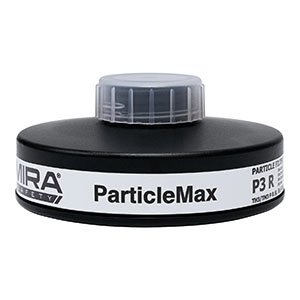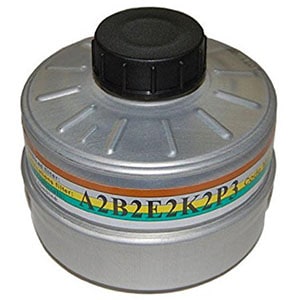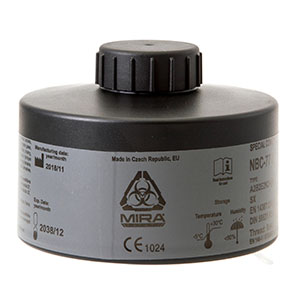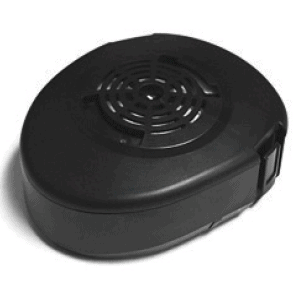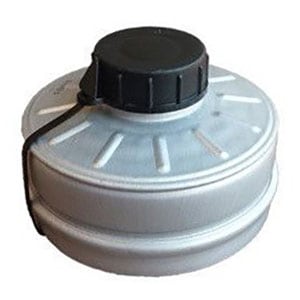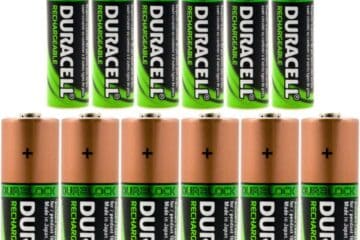So you did your homework and picked up the ideal gas mask for your purposes. That’s great. But the gas mask alone won’t do much unless you have the right filters. Gas mask filters are one of those indispensable items any prepper worthy of the title needs to have in his or her stockpile. And it’s not really open to debate. Because if you don’t have some way to protect yourself from chemical, biological or even nuclear threats, your storeroom full of food may well be useless.
The thing is, unlike canned goods or dehydrated foods, gas mask filters are not widely available, nor do they all provide equal protection from various airborne threats. If you’re not careful you could wind up buying something like Class B Brown filters that look great but are only designed to protect against hydrogen sulfide vapors, when what you need is protection against biological threats. In which case you’ll be up the creek without a paddle.
To help ensure you make the right choice of gas mask filters we’ve compiled the following buyer’s guide, which begins with a selection of some of the best gas mask filters.
Mira ParticleMax P3 Virus Filter – 6 Pack
The Mira ParticleMax P3 Virus Filter negates the need to replace all your ABEK-only filters with combo filters, or to have a separate mask for your P3 filters. These Mira P3 filters are designed with 40 mm x 1/7” NATO filter standard threading, meaning they’ll fit safely and securely on your CBRN mask. That way, if the anticipated chemical attack doesn’t materialize, but some wackjob decides to release a mutant strain of ebola into the atmosphere, you’re covered. Just remove your CBRN filters and replace them with the ParticleMax P3 filters.
Mira ParticleMax P3 Virus Filters are lightweight, compatible with all NATO compatible standard threaded gas masks, filter out 99.9999+% of biological agents. They also have an amazing 20 year shelf life and can be used during a decontamination shower. They’re a great value that will quickly and effectively double the effectiveness of your current CBRN gas mask.
Mestel Safety 40mm CBRN Gas Mask Filter
The Mestel Safety 40mm CBRN Gas Mask Filter is a classic multipurpose A2B2E2K2-P3 filter that will provide protection against a host of airborne threats. That includes chemical, biological, radiological, nuclear, bacterial and viral threats, as well as organic gases and inorganic gases such as sulfur dioxide and hydrogen chloride, and industrial gases and vapors including chlorine and hydrogen cyanide, mustard gas, sarin gas, tear gas and CN.
As icing on the cake this multipurpose mask also provides front line protection against bacterial and viral threats including antrax, smallpox, coronavirus, ebola and more. The A2B2E2K2-P3 gas mask filter is a standard issue filter for most forward deployed NATO forces. It has been rigorously tested to ensure its effectiveness and is a must-have filter for the dedicated prepper.
If recent events have proven anything it’s that the threat of biological terrorism can no longer be dismissed out of hand and so gas masks and effective multipurpose filters are a necessity. While we don’t yet know precisely where the coronavirus originated there is evidence to suggest it was manmade. And that should send shivers down the spine of any thinking person. Even if it was released accidentally the havoc it caused was a warning shot across the bow of concerned citizens everywhere who cannot count on their governments to keep them safe.
Mira 40mm NBC/CBRN Multipurpose Filter
If you have a NATO 40mm gas mask you need effective CBRN filters if it’s to be of any use. The Mira 40mm NBC/CBRN Multipurpose filter is the ideal choice. This filter is designed to protect against the full spectrum of chemical, biological, radiological and nuclear threats (except blast threats of course) and is produced by a stalwart of the filter industry.
This is a high-quality, surprisingly affordable filter that goes above and beyond the competition by including CBRN reactor technology. This enables the filter to also protect against potentially deadly reactive particles like iodine. If you’re not up on your radiological hazards, consider that one of the unreported results of the Fukushima disaster of 2011 was that it released vast amounts of iodine-131 into the air. Iodine-131 is quickly absorbed by the thyroid which, in turn, can lead to hypothyroidism or thyroid cancer.
If you are in search of a single filter to protect you from the widest variety of threats, you can’t do much better than this. It’s compatible with all NATO 40mm respirators, it’s fashioned from high-impact plastic so it’s not going to be rendered useless if you drop it and it has an amazing 20 year shelf life.
Avon FM61 NBC/CBRN Gas Mask Filter for FM50
The FM61 NBC/CBRN Filter is specifically designed for the Avon M50 gas mask. The M50 is used by every branch of the US military and by many NATO member countries. It’s a lightweight, easy to deploy full-face mask designed to be deployed in the event of chemical, biological, radiological or nuclear events.
From a practical standpoint, the FM61 filter is a low-profile filter that doesn’t protrude and create a snagging hazard like many other filters do. It also creates very little breathing resistance which makes it ideal for those trying to protect themselves while on the move. If there’s a practical downside it’s that the Avon mask uses proprietary threading, rather than the NATO standard 40mm threads. Why they would do that is a question only they can answer.
That said, if you have an Avon M50 mask these filters will enable you to build an effective wall of resistance to everything from the coronavirus to asbestos, blistering agents, CO2, sarin gas, mustard gas, hydrogen sulfide, and of course radiological and nuclear agents. If kept sealed and stored in a cool, dry place you can expect a shelf life of only 5 years. So be mindful of the expiration date if you buy these.
Israeli NATO 40mm NBC Gas Mask Filter
These 40mm NBC gas mask filters were designed to help the Israeli army protect itself against the very real possibility that one of its unhinged Middle Eastern neighbors would use nuclear, biological or chemical weapons against them. These filters use standard 40mm NATO gas mask threads, and so are compatible with a variety of masks from different manufacturers (except Avon as we just saw).
You may have noticed the designation of these as NBC rather than CBRN filters. It’s nothing to worry about. NBC and CBRN mean the same thing. CBRN is just an update of the NBC designation intended to recognize the emergence of the threat of dirty bombs. Some countries and some manufacturers still use the NBC designation, although most have migrated to CBRN.
This filter is extremely durable while at the same time being lightweight and presenting very little resistance to normal breathing. When unopened and stored properly you can expect a shelf life of 15 years.
The Purpose of the Gas Mask Filter
The job of the gas mask filter is to protect the mask wearer from airborne hazards. In most cases that means CBRN (Chemical, Biological, Radiological, and Nuclear) threats. Most high-performance gas mask filters today are designated either CBRN or NBC (Nuclear, Biological, and Chemical), which as we just mentioned, is that same thing. The gas mask filter differs from the standard dust mask or paint filter because it not only catches airborne particles, it also absorbs toxic gases and harmful molecules.
The gas mask and its filter are intended to buy you time so that you can either beat an effective retreat or wait where you are until the threat has passed. It’s not intended to be everyday gear, because if you need to wear a gas mask every day for the rest of your life, well, what would be the point of living?
Things to Keep in Mind About Gas Mask Filters
Keep the following points in mind when shopping for gas mask filters and you’ll stand a good chance of getting precisely the ones you need.
1) Gas mask filters are not universal – You would think that, when it comes to such important pieces of survival gear, manufacturers would have reached some kind of accommodation with each other enabling all filters to fit on all masks. But, just as the powers that be were never able to agree on a single universal internet browser, so too those who manufacture gas masks have clung stubbornly to their proprietary designs. So before you plunk down any of your hard earned cash on gas mask filters make sure they’re compatible with your mask.
2) Make sure you’re getting filters to deal with your anticipated scenario – If your city or town is beset by peaceful rioters your main concern may be protection from tear gas or other riot control agents (1). In that case the filter would need to be certified CBA-RCA (Chemical Biological Agent/Riot Control Agent). If, on the other hand, your main concern is being able to survive World War III then you’ll want filters that are NBC (Nuclear, Biological, Chemical), or CBRN (Chemical, Biological, Radiological, and Nuclear) rated. If the nukes start flying and you mistakenly bought CBA-RCA filters, you’re going to have a very short, unhappy post-apocalypse.
3) Be aware of both the expiration date and the amount of time the filter will last – When you purchase your filters write down their expiration date somewhere. Do this for any and all filters you buy without exception. When filters are approaching their expiration date get new ones, and don’t wait until the last minute. Also, it’s vital that you are aware how long you can expect a given filter to provide protection, and that you have plenty of spares in case you need them. If you keep breathing through filters that have exhausted their usefulness, and the threat is still in the air, you might as well not be wearing them.
4) Practice putting your mask on – This isn’t directly related to gas mask filters but it is directly related to your survival. In an emergency situation you may only have a handful of seconds to don your mask. In order to make sure you don’t fumble with it when the time comes you should practice putting your mask on until it becomes second nature.
Gas Mask Filters: FAQs
Here are some of the most common questions floating around about gas mask filters.
How Many Kinds of Filters Are There?
There are numerous types of gas mask filters on the market ranging from those designed to stop dust particles to those designed to protect you from radiological threats (2).
P1, P2 and P3 Particulate Filters
Particulate filters are designated as either P1, P2 or P3, with P1 filters providing approximately 80% protection against solid particles and P3 providing 99.97% protection against toxic solid and liquid particles and airborne microorganisms.
For the record there is no practical difference between the P1, P2 and P3 designations that originated in Europe, and the North American P95, P99 and P100 designations.
As a particulate filter captures more material it will become progressively harder to breathe through. Replacement of a particulate cartridge is usually determined by this increased breathing difficulty. (This is the only type of cartridge for which that is true. With any other type of cartridge you should not use difficulty of breathing to determine whether to replace or not, but instead rely on how long the filter is designed to work effectively.) P3 filters are commonly used to protect against dangerous viruses like ebola (3) and gained widespread popularity last year for their ability to protect against the coronavirus.
Gas Filters Such as ABEK Filters
Gas filters are designed specifically to protect against toxic substances in the air, as opposed to viruses or dust. The most popular type of gas filter is the ABEK filter with ABEK standing for class A, B, E, and K toxic gases. Many people find the gas filter classification system to be needlessly complicated, depending as it does on both letter and color designations. But whether one likes it or not the classification system is what it is.
Gas Filter Classifications
- Class A Brown filters – designed to stop organic gas and vapors such as solvents
- Class B Brown filters – designed to stop inorganic gas and vapor such as hydrogen sulfide and hydrocyanic acid.
- Class CO Black filters – designed to stop carbon monoxide
- Class E Yellow filters – designed to stop sulfur dioxide vapor and acid gas
- Class Hg Red filters – designed to stop mercury vapors (4)
- Class I Orange filters – designed to stop iodine
- Class K Green filters – designed to protect against ammonia and some organic derivatives
- Class NOx Blue filters – designed to stop nitric oxide, nitrogen oxide and nitrous vapor.
As we mentioned above the most popular type of gas filters are ABEK Brown, Yellow and Green filters that provide protection against a combination of organic and inorganic gases and vapors, sulfur dioxide vapor, acids, ammonia and its derivatives.
Multipurpose Filters
If you want to make sure you’re covered for all, or at least most, eventualities you’ll want a gas and particle multipurpose filter. These will protect you against everything from construction site dust and debris, to ebola and coronavirus, organic and inorganic gases and vapors (5), acids, ammonia and its derivatives, as well as radiological threats. This type of filter is easy to spot because it’s typically larger than other filters. That’s because of its multilayer construction which utilizes both an aerosol particulate filter and a gas filter. Combination filters fall into the following classes.
A2-P3 filters – protects against solid and liquid particles, organic gases and vapors, bacteria and viruses as well as highly toxic and radioactive particles.
B2-P3 filters – Protects against inorganic airborne threats like chlorine, hydrogen sulfide and hydrogen cyanide, solid and liquid particles, bacteria and viruses and toxic and radioactive particles.
E2-P3 filters – Provides protection from acid gas and sulfur dioxide, solid and liquid particles, bacteria and viruses, and toxic and radioactive particles.
K2-P3 filters – Protects against ammonia and its derivatives as well as solid and liquid particles, bacteria and viruses, and toxic and radioactive particles.
A2B2-P3 filters – Protects against organic and inorganic gases and vapors as well as solid and liquid particles, bacteria and viruses, and toxic and radioactive particles.
A2B2E2K2-P3 filters – If you’re looking for a fairly easy to find all-purpose filter here it is. Protects against organic and inorganic gases and vapors, acids and vapors like sulfur dioxide, ammonia and its derivatives (6), as well as solid and liquid particles, bacteria and viruses, and toxic and radioactive particles.
AX-P3 filters – Protects against organic gases and vapors with a boiling point below 65 degrees Celsius (7), solid and liquid particles including ebola, and highly toxic and radioactive particles.
Reactor Hg-P3 filters – Protects against mercury, radioactive iodine, methyl iodine, solid and liquid particles including ebola and coronavirus, and highly toxic and radioactive particles.
A1E1Hg-P3 filters – Provides protection against acid vapors, mercury vapor, organic and inorganic gases and vapors, ammonia and its derivatives, solid and liquid particles including bacteria and viruses, and highly toxic and radioactive particles.
A2B2E2K2-Hg-P3 filters – Protects against acid vapors, mercury vapors, ammonia and its derivatives, organic and inorganic gases and vapors, as well as solid and liquid particles including bacteria and viruses, and highly toxic and radioactive particles.
That’s a lot to digest, we know, and the complexity of gas mask filter classifications is one of the reasons people just get a P3 filter, or a reliable all-purpose filter like the A2B2E2K2-P3 filter.
How Long Will a Gas Mask Filter Provide Protection?
It will vary from filter to filter. With gas filters you should change them based on their projected useful lifespan. Some CBRN/NBC gas filters will provide 12-24 hours of protection, while others might draw the line at 8 hours. In a tight, enclosed environment with a heavy concentration of gas you might only get 1 hour out of your filter. With particulate filters you’re advised to keep using them until it becomes difficult to breathe through them. This will indicate the filter is clogged with particulate matter and should be changed.
It’s vital that you do not confuse the two methods of determining when to change the filter. If you’re waiting for a gas filter to get so clogged you can’t breathe through it it may well pass the threshold beyond which it is no longer useful and then you could be breathing in highly dangerous toxins or radioactive particles. You may not drop dead on the spot but then again it might not be too long before you do face a very nasty end indeed.
What’s The Shelf Life of a Gas Mask Filter?
Again, it depends on the filter. Some, like the Avon M61 filter, have a shelf life (8) of 5 years. Using it after that is asking for trouble. On the other hand some of the NATO 40mm filters may last for 10-20 years before they need to be replaced. Expiration information should come stamped on the outside of the filter or package the filter comes in. If it isn’t you should either send the filter back (good luck with that) or discard it.
Do All Gas Mask Filters Fit All Gas Masks?
No. Unfortunately, some manufacturers produce filters with proprietary threading that will only work with their brand of gas mask. It is crucial that you check compatibility before you purchase gas mask filters. Many manufacturers will not accept returns so once you hand over your money you’re committed to the purchase.
Again, some will recommend that you simply buy the most popular type of filter (the NATO 40mm) to ensure a proper fit. But buying 40mm NATO filters doesn’t guarantee anything unless your gas mask accommodates that kind of filter. If you have any questions or doubts about whether a particular filter will fit your mask, write to the manufacturer or the reseller.
Final Thoughts
No filters, no gas mask. No gas mask, no ability to emerge from a rash of possible negative outcomes involving industrial accidents, train derailments, biological warfare (9), nuclear accidents, nuclear terrorism or World War III.
Gas mask filters are a small but indispensable component of any credible survival stockpile. Use the above information to help you determine which gas mask filters are right for your particular situation and then get busy stocking up.
